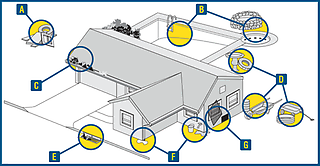
The most effective way to prevent a West Nile virus (WNV) infection is to avoid mosquito bites. For additional WNV services and information, including information for health professionals visit the West Nile virus Government of Canada website.
Mosquitos develop in stagnant water. You can reduce the number of mosquitos around your home if you eliminate stagnant water on your property.

Uncovered garbage containers and junk piles collect water in which mosquitos can breed.
Poorly maintained pools and swimming pools can be breeding sites for mosquitos.
Clogged gutters will accumulate water and create a place for mosquitos to breed. Check flat roofs frequently for standing water.
Clean up and empty water in toys, birdbaths, tires, flowerpots, wheelbarrows, and other garden objects where mosquitos can breed.
Fill in low depressions in lawn areas. Eliminate standing water in gutters or storm drains to prevent small ponds. Install screens over catch basins. Turn compost over frequently.
Repair any leaks to faucets and hoses to prevent possible breeding sites. Prevent water from pooling around downspouts and air conditioners.
Crawl spaces, attic vents, and broken screens allow mosquitos to enter your home. If you don’t have screens, try to keep windows closed between dusk and dawn.
Since 2009, Ontario no longer conducts a West Nile virus dead bird surveillance program.
If you find a dead bird on your property:
If Toronto Animal Services is picking up the dead bird, store the bird in a cool place until arrangements have been made for pick up.